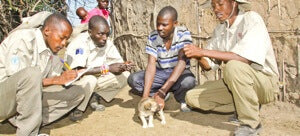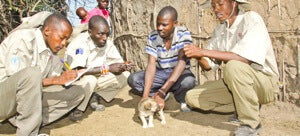
A risk for animals and humans

need
There are still many human deaths from rabies every year, although infection can be prevented by simply vaccinating dogs
activity
Veterinarians Without Borders sends Kenyan veterinarians to remote villages to protect and educate people without access to health care about rabies.
Measurable performance
Number of vaccinations that could be carried out for domestic and herding dogs
Result
Measurable reduction in rabies transmission to humans through sensitized handling of animals and vaccinations
Systemically relevant impact
Improved health and safer interactions for people with dogs and wild animals.
background


The good deed
AboutKenya
Nairobi
Capital city
41800000
Population
994.31 USD
Gross domestic product
per capita per year

145
Human Development Index
(Human Development Index)


